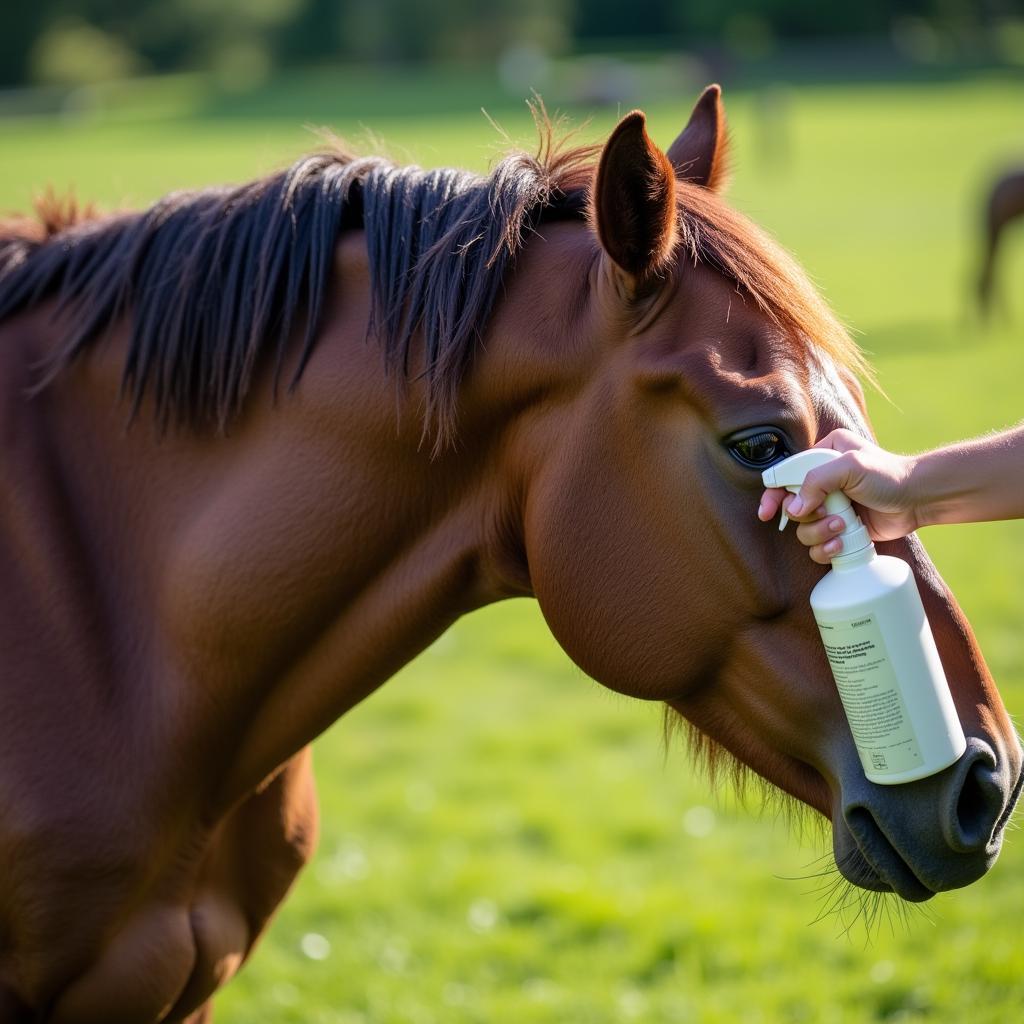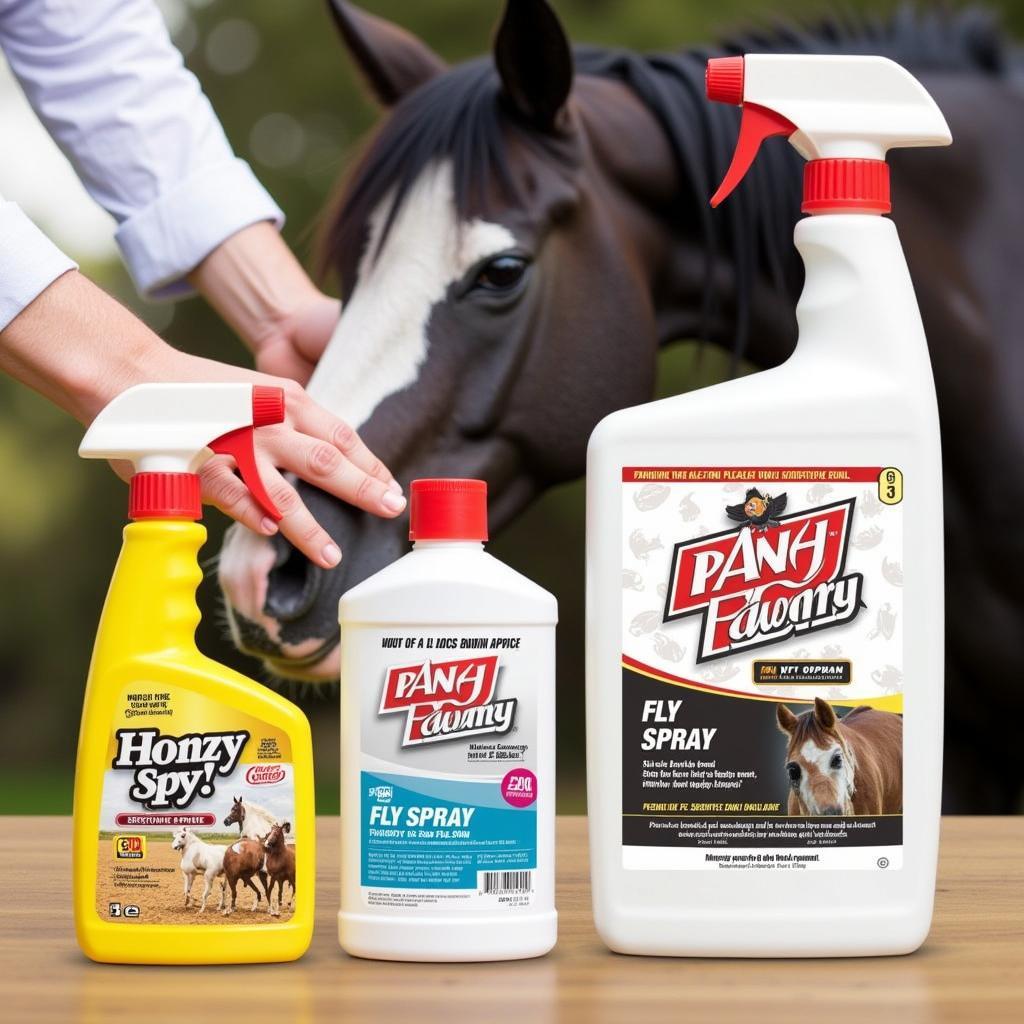Finding the best fly spray for horses can feel like searching for a needle in a haystack. With countless products lining the shelves, each promising to be the ultimate solution, it’s easy to get overwhelmed. This article aims to guide you through the process of selecting the most effective fly spray for your equine companion, ensuring they stay comfortable and protected during fly season.
Understanding the Importance of Fly Control for Horses
Flies are more than just a nuisance for horses; they can cause serious health problems. From painful bites and allergic reactions to the transmission of diseases, flies can significantly impact your horse’s well-being. Effective fly control is essential for maintaining your horse’s health and comfort, allowing them to graze peacefully and enjoy their time outdoors. Choosing the right fly spray is a crucial step in achieving this. You can learn more about different fly control methods on our page about horse fly sprays.
Key Ingredients in Effective Horse Fly Sprays
Understanding the active ingredients in fly sprays is vital for making an informed decision. Some common ingredients include pyrethrins, permethrin, and DEET. Each ingredient has its own strengths and weaknesses, making some more suitable for specific situations than others. For instance, pyrethrins are derived from natural sources and offer quick knockdown power, while permethrin provides longer-lasting protection. DEET is a powerful repellent, but it’s important to use it cautiously and follow the manufacturer’s instructions. Learning about these ingredients will help you choose a spray that is both effective and safe for your horse.
 Applying Fly Spray to a Horse
Applying Fly Spray to a Horse
Factors to Consider When Choosing a Fly Spray
When selecting a fly spray, several factors come into play. Consider your horse’s individual needs, such as their sensitivity to certain ingredients or their level of exposure to flies. The environment also plays a role. If your horse spends a lot of time in a heavily wooded area, you may need a stronger formula than if they primarily graze in open pastures. Also, consider the duration of protection offered by the spray. Some sprays provide protection for several hours, while others last for up to a week. If you are looking for alternative methods of fly control, you might consider fly drops for horses.
What is the Best Application Method for Horse Fly Spray?
Proper application is crucial for maximizing the effectiveness of any fly spray. Always follow the manufacturer’s instructions carefully. Apply the spray evenly to your horse’s coat, avoiding sensitive areas like the eyes and nose. Using a horse sprayer can help ensure even coverage. Some sprays require reapplication after sweating or rain.
 Choosing Fly Spray for Sensitive Horses
Choosing Fly Spray for Sensitive Horses
Natural Fly Spray Options for Horses
For those seeking a more natural approach, several natural fly spray options are available. These sprays often utilize essential oils and botanical extracts to repel flies. While natural sprays can be effective, they may require more frequent application than their synthetic counterparts. It’s important to research the specific ingredients to ensure they are safe for your horse and provide adequate protection. Sometimes, eye issues can be exacerbated by flies, so it’s important to address any underlying issues like an ulcer in horses eye.
How to Make Homemade Horse Fly Spray
Some horse owners prefer to make their own fly spray using household ingredients. While homemade sprays can be a cost-effective option, it’s crucial to use safe and effective ingredients. Common ingredients include apple cider vinegar, essential oils like citronella and lavender, and witch hazel. Always research recipes thoroughly and test the spray on a small area of your horse’s coat before applying it liberally.
“Homemade fly sprays can be a great option,” says Dr. Emily Carter, DVM, “but it’s important to use caution and ensure the ingredients are safe and won’t irritate the horse’s skin.”
What Fly Spray is Safe for Pregnant Mares?
Choosing a fly spray for a pregnant mare requires extra care. Certain ingredients can be harmful to the developing foal. Always consult with your veterinarian before using any fly spray on a pregnant mare to ensure it is safe for both the mare and the foal. They may recommend specific products or suggest alternative fly control methods.
Protecting Your Horse from Flies: A Multi-Faceted Approach
Fly sprays are just one part of a comprehensive fly control strategy. Other measures, such as using fly masks, fly sheets, and maintaining a clean stable environment, can significantly reduce fly populations and provide your horse with added protection. Consider using cattle fly tags for horses as an additional layer of defense.
Conclusion
Choosing the best fly spray for horses requires careful consideration of your horse’s individual needs, environmental factors, and the available product options. By understanding the key ingredients, application methods, and safety considerations, you can make an informed decision that will keep your horse comfortable and protected throughout fly season. Remember, the best fly spray is the one that works most effectively and safely for your equine companion.
FAQ
- How often should I apply fly spray to my horse?
- What are the signs of an allergic reaction to fly spray?
- Can I use human insect repellent on my horse?
- Are natural fly sprays as effective as synthetic sprays?
- What should I do if my horse gets fly spray in its eyes?
- How can I prevent flies from breeding around my stable?
- What are the best fly control practices for horses during the summer months?
For further information, check out our articles on fly drops for horses.
Need help with choosing the right fly spray for your horse? Contact us! Phone: 0772127271, Email: [email protected] or visit us at QGM2+WX2, Vị Trung, Vị Thuỷ, Hậu Giang, Việt Nam. We have a 24/7 customer support team ready to assist you.